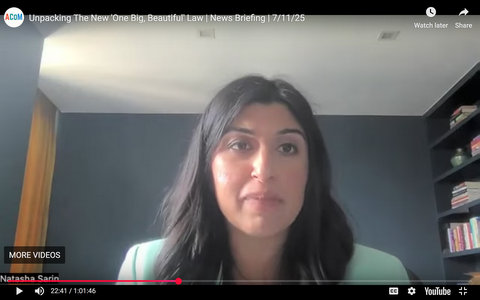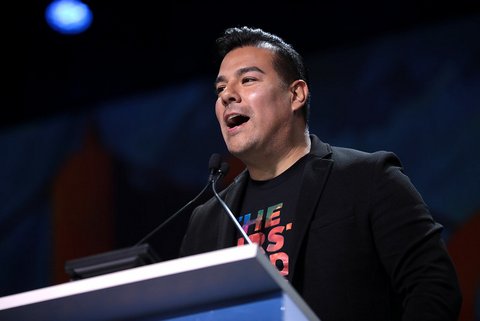
27 Jul Experts Warn ‘Big Beautiful Bill’ Could Bring Harm to Health, Climate and Economy

Yale professor Natasha Sarin said “the biggest winners” of the so-called One Big Beautiful Bill are people making millions of dollars a year, and people “close to or below the poverty line are the biggest losers of the package.” (Screenshot captured by Danielle Parenteau-Decker / The CC Pulse)
By Danielle Parenteau-Decker
The so-called One Big Beautiful Bill could have costly consequences for years to come, including higher prices, millions losing health insurance, worsening climate change, and thousands of preventable deaths.
That’s according to a panel of experts convened July 11 by American Community Media to break down the sweeping legislation.
“If you look at this bill and you assume that its provisions are made permanent, the bill is as big as the entirety of the federal government’s response to COVID, so the CARES Act and the American Rescue Plan and then also the big legislative pieces of the Biden administration, the bipartisan infrastructure law and the CHIPS Act,” said Natasha Sarin, a professor at the Yale law school and school of management.
Larry Levitt, executive vice president for health policy at KFF, said the bill “represents the biggest change to the health care system since the passage of the Affordable Care Act 15 years ago” and erases “much of its gains.”
“The scale of the change to the healthcare system is staggering,” he continued.
The bill reduces health insurance benefits and eligibility under both the ACA and Medicaid. One key provision imposes new work requirements, which Levitt said would cause 4.8 million people to lose coverage, mainly because they won’t be able to navigate the paperwork and bureaucracy.
But it won’t happen immediately.
“We’re not all going to wake up one morning and find millions more people uninsured,” he said. “The changes to Medicaid and the ACA are going to roll out bit by bit over the next decade.”
Levitt also warned that many low-income immigrants who are lawfully present could lose access to premium assistance under the Affordable Care Act, as well as eligibility for Medicaid or Medicare.
To justify the cuts, Levitt said Republicans have framed the changes as eliminating fraud, waste and abuse. But he pushed back.
“Healthcare fraud is certainly an issue,” he said. “But it is primarily perpetrated by rogue healthcare providers, and there’s nothing in this bill that addresses that kind of fraud.”
The bill would reduce federal health spending by more than $1 trillion over the next 10 years, Levitt said.
But according to Sarin, the bill could cause 16 million people to lose health coverage, which could lead to 100,000, probably closer to 200,000 preventable deaths over next 10 years.
Her comments focused mostly on the expected economic impact of the bill.
People making millions of dollars a year “are the biggest winners of this package” and people “close to or below the poverty line are the biggest losers of the package.”
“The very wealthiest people in the economy,” Sarin said, “are getting a huge tax cut.”
The top 0.1% economically will get “something like a few hundred thousand dollars of tax cuts … because they’re the ones most impacted by the extension of the Trump tax cuts and particular provisions in this bill that provide them a greater share of the pie,” she said.
People in the bottom 40% of income are “actually worse off after this bill than they were before the bill’s passage,” she said, “because they are the ones bearing the brunt of these cuts.”
The bill is “deficit-financed,” Sarin said, which will lead to higher interest rates for the government, with real effects on people’s lives.
“Mortgage costs are going to be thousands of dollars higher,” “small business loans are going to be more expensive” — “car loans, student loans, basically any type of borrowing that’s being done in the economy has been impacted by this legislation and pushed up the cost of it.”
And it’s not just this legislation that hurts people with lower incomes.
“If you take the bill … and this administration’s trade policy, it’s like a double whammy on American consumers at the bottom of the distribution,” said Sarin, who said it was “reverse Robin Hood economic policy because we are taking from the bottom of the distribution and giving to the top of the distribution.”
And even some of the apparent benefits in the bill are not what they seem.
The Child Tax Credit goes up from $2,000 to $2,500, but it’s not refundable.
>>>From Our Archives:
The Expanded Child Tax Credit Gave Poor Families a Boost, But It Didn’t Last<<<
The no tax on tips or overtime provision does not actually mean workers would not pay tax on tips received or overtime worked; instead, it pertains to a tax deduction.
Seniors also qualify under the bill for a higher standard deduction.
“So there is a tax benefit to being a senior,” said Richard Prisinzano, director of policy analysis at The Budget Lab at Yale. “I think the benefit is pretty small.”
Sarin agreed. “This is a very small step in the direction of a benefit for seniors.”
The economic impacts also hit green industry particularly hard.
“The environmental impacts of this bill are very large,” said noted eco-activist Bill McKibben.
During the 2024 campaign, “President Trump promised that if the fossil fuel industry gave him a billion dollars that he would give them anything they wanted,” McKibben said. “They gave him about half that, but it turns out to have been enough because the Big Beautiful Bill is absolutely stuffed with provisions that are designed quite clearly to slow the transition to renewable energy.”
Among other things, the bill ends tax breaks for solar and wind energy and for electric vehicles — “clearly this is all an effort to try and wreck the EV industry,” he said — and is expected to result in mass layoffs at companies that specialize in things like installing rooftop solar panels.
That means “lots and lots of clean energy projects will be canceled” and “lots and lots of business disappearing in the years to come.”
Utility prices will also rise, McKibben said, because renewable energy is now the cheapest form of energy and this bill pushes back efforts to reduce air pollution.
“The most vulnerable communities in this country are the ones that are going to be hit hardest” by the effects of this legislation, McKibben said, just as the effects of climate change will “fall hardest on the poorest communities.”






No Comments